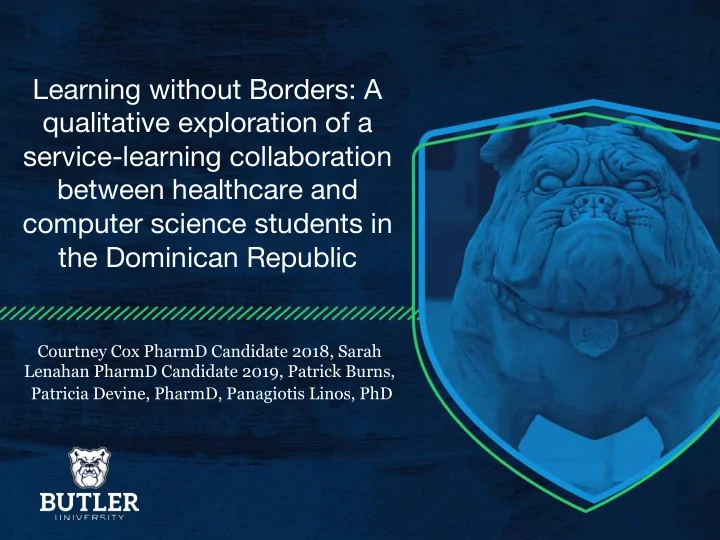

Learning without Borders: A qualitative exploration of a service-learning collaboration between healthcare and computer science students in the Dominican Republic Courtney Cox PharmD Candidate 2018, Sarah Lenahan PharmD Candidate 2019, Patrick Burns, Patricia Devine, PharmD, Panagiotis Linos, PhD
Presentation Layout I. Background II. Mission Trips to the Dominican Republic III. Engineering Projects in Community Service (EPICS) @ Butler IV. Electronic Medical Record (EMR) Mobile Application V. Service-learning Study
Background • Healthcare students partnered with Engineering Projects in Community Service (EPICS) students • An electronic medical record (EMR) was built to be used in a medical clinic in the Dominican Republic • EMR = Safer patient care 3
COPHS Mission Trips to the Dominican Republic • Healthcare students partner with the nonprofit organization, Barnabas Task – Organize and execute a medical clinic complete with diagnostics and pharmacy • Each May since 2014 4
EPICS @ Butler University • Established at Butler in 2001 based on the national EPICS model started at Purdue University • Undergraduate Computer Science & Software Engineering students form teams to develop cutting-edge software for local non-profit organizations 5
About the Clinic 6
Electronic Medical Record (EMR) Mobile Application 7
Electronic Medical Record (EMR) Mobile Application 8
Electronic Medical Record (EMR) Mobile Application 9
Study Objectives • 1. Identify student learning and cross- cultural awareness when students travel abroad for a medical mission trip. • 2. Analyze student experiences of interprofessional relationships.
Methods Study Population: • 65 volunteers – 20 EPICS students, 15 healthcare students, 20 DR volunteer student translators, 10 American and DR healthcare providers Survey Instrument/Description: • Formatted on Qualtrics – 50 questions utilizing skip logic, multiple choice, and free response questions – Demographics, role in the project, experience knowledge gained
Results • A total of 65 participants were sent the survey, with 51 opting to complete the survey for a response rate of 89%. • Students gained: – Cultural awareness – Interprofessional collaboration – Communication – Teamwork – Technical skills (Swift, XCode, blood pressure measurements)
Student Experiences • “They {EPICS students} were so important to the clinic running smoothly.” • “I was impressed with the all-around project because the work we would be doing would have a meaningful impact.” • “They {EPICS students} are incredible! The trip wouldn’t have been the same without them. I’m thankful for the skill set they brought to work each day but more importantly, I’m blessed to now be able to call them my friends.” • “They {healthcare students} provided inspiration for how we can continue to make a difference.” • “It was incredible and even better on our end to see the work we put in over the semester at work in real time helping people in need. It really gives us a different perspective. It has made me want to go back again next year.”
Conclusion • Collaboration between computer science/software engineering students and healthcare students facilitates: – Advances in education – Skills of communication, leadership, and teamwork – Appreciation for other fields • Collaboration with students of another country developed appreciation of differing cultures
Questions? • Feel free to stop by during the poster session to check out our app up close!
Recommend
More recommend